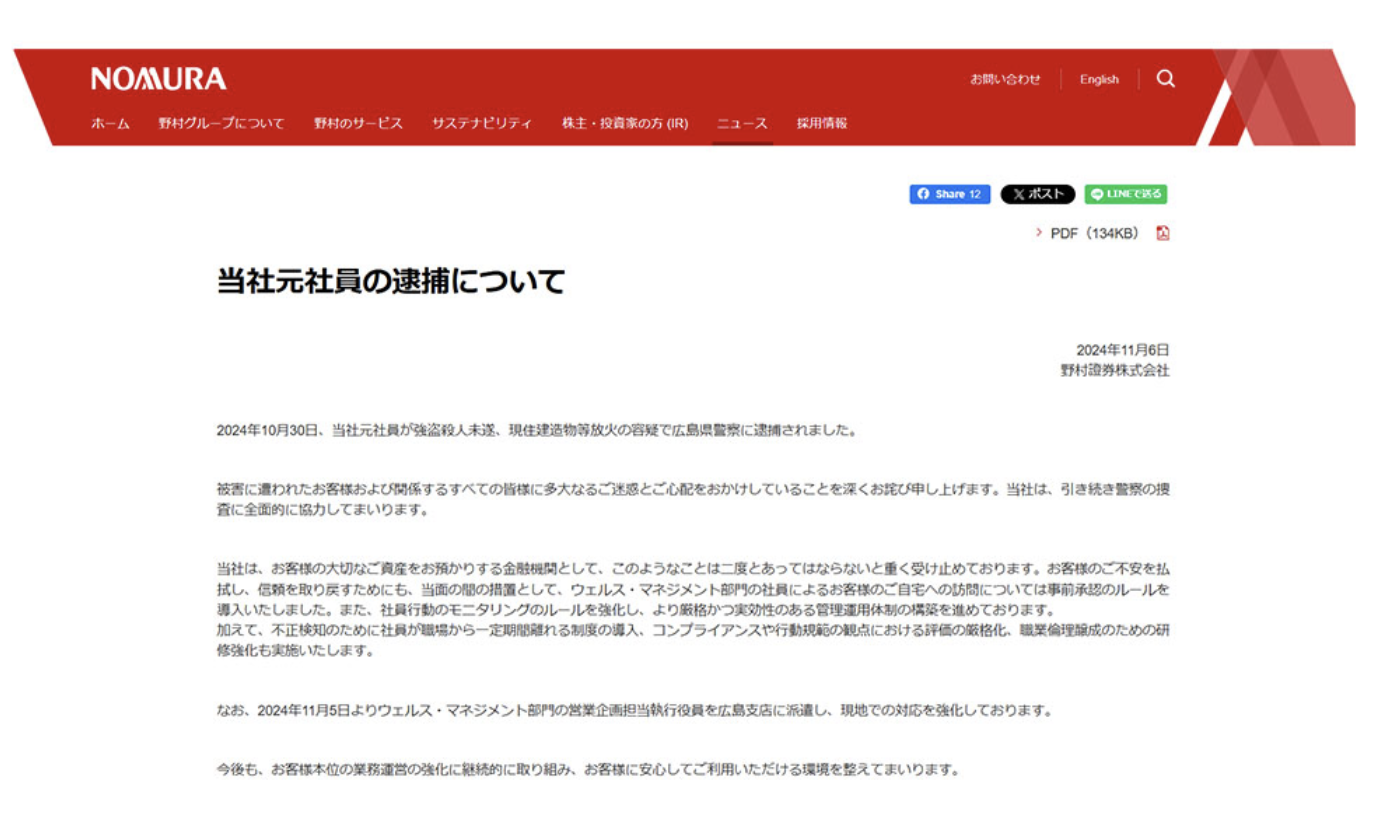※Translated with Notion AI. (Plus version)
While I will omit the details of the incident involving a former Nomura Securities employee (who was dismissed for disciplinary reasons 7 days after the incident) as it continues to be reported in the media, Nomura Securities announced after the incident came to light that they would implement a rule requiring prior approval for employees to visit customers’ homes.
This means that my long-standing assertion that “face-to-face sales need to evolve” has been set in motion, albeit as a result of the worst-case scenario.
However, this is not an “industry-wide rule” for all securities companies, but rather one independently established by the company involved in the incident.
As this company happens to be the largest in the industry, it is expected that some companies may follow suit, but not all securities companies will respond in the same way.
When speaking with some securities company presidents, they say, “In Japan’s securities industry, there are ‘large securities firms,’ ‘mid-sized securities firms,’ ‘small securities firms,’ and ‘boutique securities firms.’
Due to differences in capital and scale, naturally, the capabilities of employees vary greatly.
At the same time, because investor literacy also varies significantly, if we were to start imposing strict, nationwide uniform rules, the benefits to investors would also drastically decrease.”
However, I would like to continue strongly advocating for the “need for evolution in face-to-face sales.”

Having worked at foreign investment banks for over 30 years and introduced and distributed products to many Japanese securities companies, I have found that the literacy of product division staff regarding customer protection is very low, and their understanding of product knowledge is not particularly high.
Given that their income is higher than in general industries, all I could see was an attitude of responding to revenue pressure from management.
For the benefit of younger readers, let me explain the problems with Japan’s traditional “face-to-face sales” in chronological order.
Until the end of the bubble era, it was a normal trading style for securities companies to forcefully sell stock recommendations based on their own interests.

The bubble economy era of the 1980s
At that time, knowledge of financial engineering had hardly penetrated Japan, and customers made investment decisions based solely on the company’s reputation and the enthusiasm of the sales representatives.
Behind the scenes, practices such as “loss compensation” were also taking place.

Subsequently, while “loss compensation” ceased, securities companies continued to sell individually recommended stocks through “face-to-face sales.”
As a result, many investors lost their wealth and assets during long-term stock market downturns.
Even now, with the development of financial engineering and the ability to manage various risks and predict market trends, “face-to-face sales” continue.

The recent problematic sales of structured bonds that have caused significant damage are also the result of “face-to-face sales.”
It’s not that “face-to-face sales” itself is bad, but the low level of “face-to-face sales management” is the problem.
In an era where sales using tablets is commonplace, I cannot understand why there is no investment in management programs.
A significant portion of when and with whom salespeople meet, what they propose, what kind of conversations they have, and what they hear should be manageable through programs that also reduce the burden on salespeople.
As a result, customer management and risk management would become possible for the company simultaneously.

If “face-to-face sales” are to continue, isn’t this now an essential management decision?
Even students would understand that merely requiring prior approval for who to meet will not prevent crimes and accidents.
The economy is about money circulating from person to person until it runs out.

In other words, it’s a world created by people talking to each other.
Digitizing the time and content from the entrance to the exit of these interactions as much as possible should be very useful as material for management decisions in securities companies.

I predict the following:
Incidents and accidents involving investors through “face-to-face sales” will not decrease rapidly in Japan.
I would like to explain in detail the reasons for this and the anticipated incidents and accidents in the near future.

This time, I focused on making readers aware of the lenient response of the securities industry.







